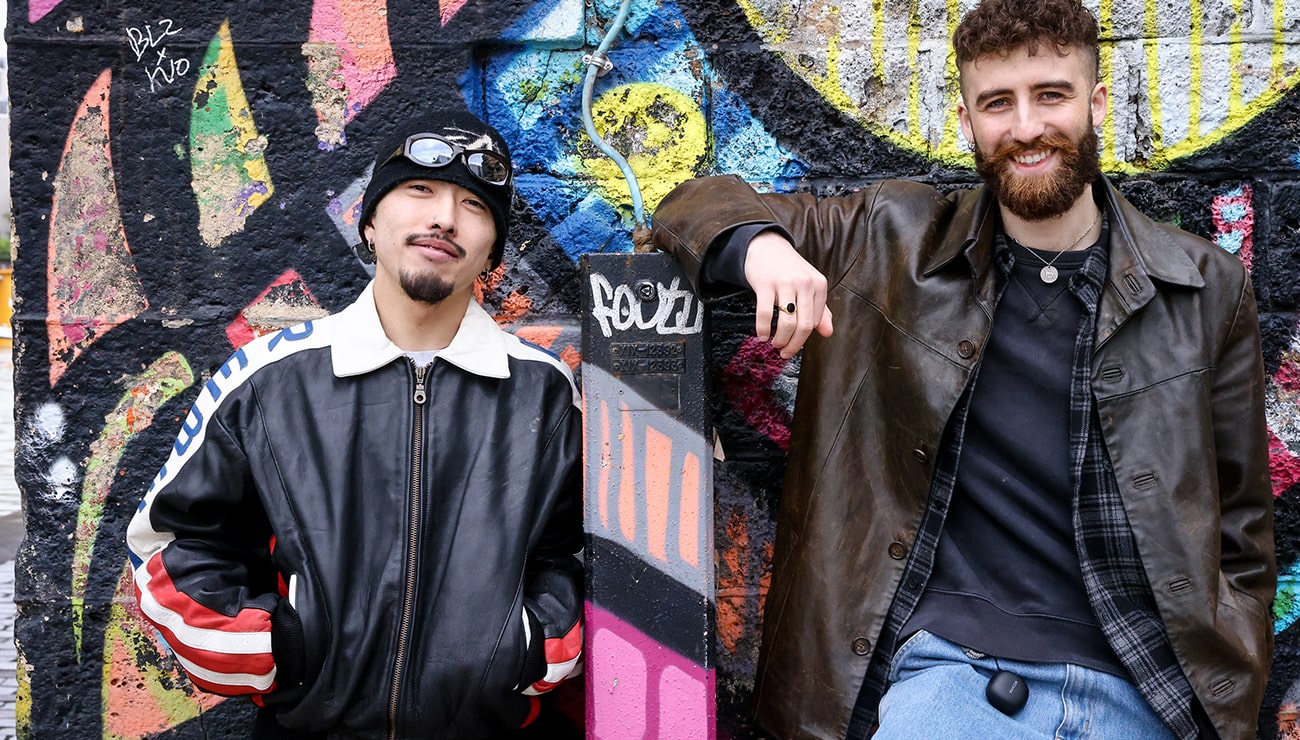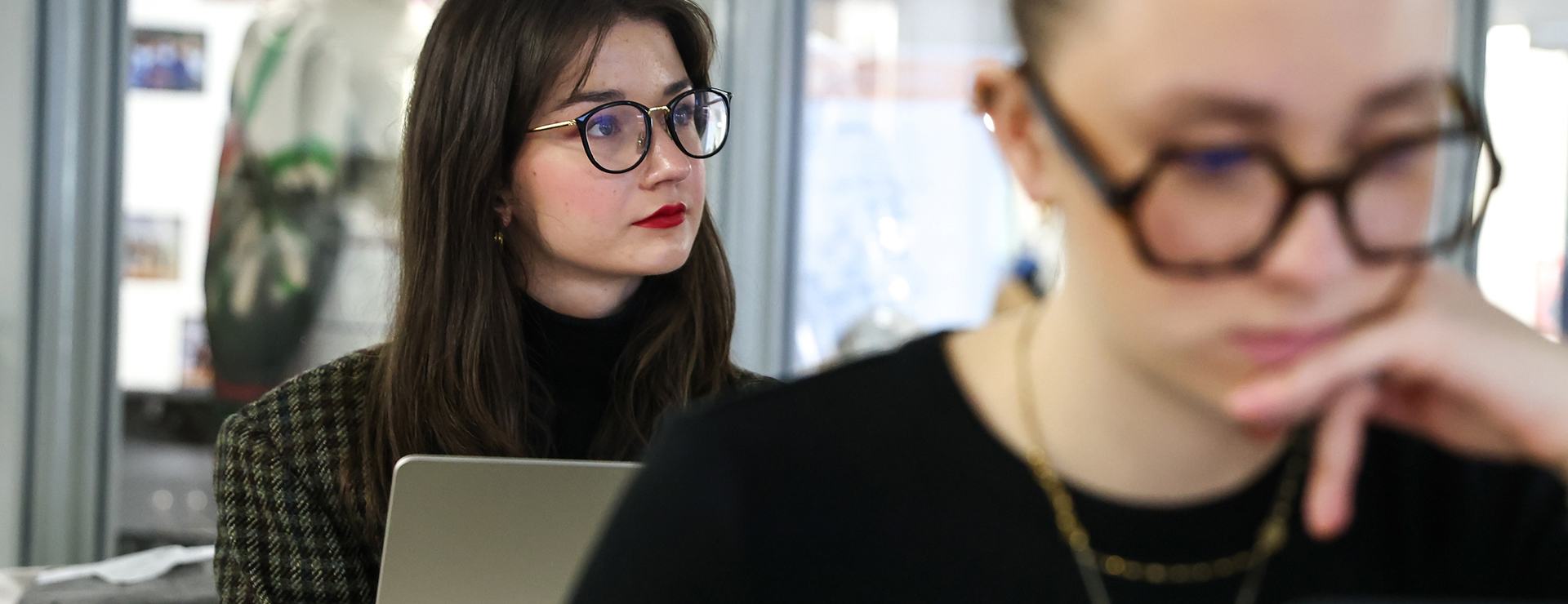- Available in: Paris, Istanbul and online
- Language: Full French or Full English
- Duration: 2 years
- Cooperative Education: French Language Only
- ECTS: 120
- Next intake: September 2025
This MBA is for aspiring fashion entrepreneurs seeking to leverage technology to disrupt the industry. The program fosters a culture of experimentation and innovation, encouraging students to embrace a scientific approach, providing them with the tools and knowledge they need to build successful tech-driven fashion brands.
Learning Objectives
- Foster Entrepreneurial Mindset and Skills: Students will develop the entrepreneurial mindset and skills necessary to launch and scale fashion tech startups, including opportunity recognition, business model innovation, and strategic decision-making in a dynamic and competitive market.
- Become Skilled in the Integration of Technology and Fashion: Students will learn to seamlessly integrate cutting-edge technologies, such as AI, augmented reality, and digital platforms, into the development of fashion products and services, driving innovation and creating value in the fashion tech space.
- Develop Robust Business Strategies for Fashion Tech Ventures: Students will gain the expertise to craft comprehensive business strategies that address the unique challenges of fashion tech startups, including securing funding, managing operations, and navigating the complexities of product development and market entry.
- Lead Sustainable and Scalable Growth in Fashion Tech: Students will learn to lead and manage the growth of fashion tech ventures by applying principles of sustainability and scalability, ensuring that their startups not only thrive in the short term but also contribute to a responsible and future-proof fashion industry.
Postgraduate - Year 1
The aim of year 1 is to prepare students who study fashion management and marketing for the responsibilities they will have to take on in management positions within companies.
6-month internship or cooperative education (French programs only)
Fourth-year highlights
- Customising of the curriculum: The choice of two electives
- Crisis communication management project: The “Fashion faux-pas ” in collaboration with students following the Fashion Design Postgraduate Program
- Operational consulting project with a global fashion brand focusing on innovating the customer experience.
- Development of an international solidarity project with the UN's IOM (International Organisation for Migrants)
- Intercultural Fashion Advocacy Project : Understanding fashion as a tool for diplomatic relations
Advanced Marketing & merchandising
The advanced marketing and merchandising module groupings is designed to equip students with cutting-edge knowledge and skills to excel in today’s dynamic fashion marketplace. These modules delve into sophisticated marketing strategies, consumer behavior analysis and the integration of data analytics to inform decision-making. Students will explore advanced topics such as brand management, global marketing trends, and omnichannel retail strategies.
- Strategic planning
- Distribution
- Innovative client experience
- Sensory marketing
- Branding
The fashion industry
The Business of Fashion modules offer an in-depth exploration of the fashion industry from a business perspective. These modules cover essential topics such as intellectual property and corporate law as well as a variety of subjects related with the development of business models. Through case studies, industry projects, and expert lectures, students will develop the strategic thinking and practical skills needed to thrive in the fast-paced and ever-evolving fashion business landscape.
- Planning
- Finance
- Advanced strategies
- Intellectual property
- Corporate law
Fashion’s Environment
This module grouping looks at fashion with the prism of diversity and inclusivity. It prepares our students to address the future needs of a competitive fashion industry, whether it is the optimization of the supply chain through a sustainable perspective, the implementation of cutting-edge tech processes for digital retail or the consideration of contemporary fashion phenomena.
- E-commerce
- Intercultural fashion
- Sustainable sourcing
- Managing a “fashion faux pas”
Two options from:
Students will get to pick 2 electives out of 6 available. Each of them gives a taste of what the 5th year specializations will encompass. Such a structure provides an opportunity for full customization of the learning experience.
- MBA Fashion and Luxury Marketing
- Media and image production
- Fashion and eco-responsibility
- Entrepreneurship and innovation
- Fashion design workshop
Fashion Lab
The Fashion Lab module grouping is handled by the Direction of Corporate Relations of IFA Paris. Through a variety of practical workshops, students will get the opportunity to be involved in real-life case studies provided by partner brands. They will also have the opportunity to work on their professional profile through customized coaching sessions to ensure they can secure a 6-month internship.
Postgraduate - Year 2
The program is also aimed at students who have a genuine passion for innovation and who see tech as an essential element in the restructuring of the fashion industry. Throughout the course, students are encouraged to adopt a scientific, practical and iterative experimentation strategy in their approach to tech and innovation.
6-month internship or cooperative education (French programs only)
Second-year highlights
- In-depth training for the challenges faced by entrepreneurs: investor pitches, financing strategies, administrative and legal issues
- Fashion Technology lab workshops for hands-on experimentation
- Personalized professional experience tailored to the student’s project: startup internships, cooperative education, consulting projects, or launching a company
Conceptualization
The conceptualization module grouping is designed to equip students with the essential skills to innovate and lead in the intersection of fashion and technology. The topics cover comprehensive market research techniques tailored to the fashion tech industry, enabling students to identify emerging trends and consumer needs. Students will learn to develop Minimum Viable Products (MVP) and conduct effective beta testing to iterate and refine tech-driven fashion solutions.
- Market research
- Beta-testing
Startup development
This module grouping focuses on developing successful startup business The topics cover essential aspects of entrepreneurship by anchoring them in relevant legal frameworks. There is an emphasis on lean startup methodologies, funding strategies, and scaling operations.
- Business Model
- Fundraising strategies
- Lobbying strategies
- Legal Environment Applied to Startups
Marketing
In this module grouping, students will explore cutting-edge promotional tactics, including digital marketing, influencer partnerships, and immersive experiences. The curriculum emphasizes the integration of technology and data analytics to optimize marketing efforts, ensuring that graduates can effectively navigate and influence the rapidly evolving fashion tech landscape.
- AI Powered Forecasts
- Fashion Metaverse
- Marketing through Influence
- Public relations
Lab Experimentation
The Lab Experimentation module grouping is a hands-on, innovative course designed to bridge technology and fashion. This module focuses on the application of cutting-edge technologies such as 3D printing, wearable tech, smart textiles, and augmented reality in fashion. Students will engage in experimental projects, prototyping, and real-time testing of tech-integrated fashion solutions. Through collaborative lab sessions, they will learn to harness technological advancements to create innovative fashion products and experiences. This module aims to foster creativity, technical proficiency, and a forward-thinking approach, preparing students to lead and innovate at the intersection of fashion and technology.
During this module, students will be invited to work in our New Technologies Laboratory Foundry.
StartUp Challenge
The Startup Challenge is a dynamic and practical experience designed to immerse students in the entrepreneurial world of fashion technology. Participants develop and refine their startup concepts, learning to articulate their ideas effectively to potential investors and stakeholders. Through workshops, mentoring sessions, and mock pitches, students gain invaluable insights into the startup ecosystem, honing their presentation skills and business acumen.
- The Art of the Pitch
- Startup Project
Fashion Lab
The Fashion Lab module grouping is handled by the Direction of Corporate Relations of IFA Paris. Through a variety of practical workshops, students will get the opportunity to be involved in real-life case studies provided by partner brands. They will also have the opportunity to work on their professional profile through customized coaching sessions to ensure they can secure a 6-month internship.
Program Compliance Data
Validation of the program
Successful completion of the program depends on validating the targeted skills.
No pathway/No transfer
Result indicators
- Drop-out rate: N/A (1st class graduates in 2024)
- Attendance rate for certification tests: N/A (first graduating class in 2024)
- Success rate of the program: N/A (first graduating class in 2024)
- Further study rate: N/A (1st class graduates in 2024)
- Rate of entry into employment after 6 months: N/A (1st class graduates in 2024)
- Employment rate in the targeted profession “Fashion Marketing and Product Development Manager” at 6 months: N/A (first graduating class in 2024)
- Value added by the establishment: N/A (1st class graduates in 2024)
Prerequisites:
- Year 1: Hold a Bachelor in Fashion Design and work experience in the fashion industry
- Year 2: Hold a Bachelor in Fashion Design, 60 ECTS credits (or equivalent) in a postgraduate fashion designing program plus work experience in the fashion industry
Course duration
The Fashion Marketing and Product Development Manager course consists of a two-year cooperative education, with +/- 504 hours per year.
Classes are held in person or online and take the form of group work, face-to-face teaching, conferences, and more.
Operational objectives/Target skills
- To analyse trends and strategies in the fashion and luxury market as part of the development of a brand or concept
- To create a comprehensive fashion or luxury brand or concept, including the analysis of the competition and image strategy
- To define a marketing strategy for a fashion or luxury brand or concept
- To develop communication and digital marketing strategies designed to promote a fashion or luxury brand or concept
- To devise a distribution strategy aimed at rolling out the fashion or luxury brand or concept across its territories and markets, online, off-line and phygitally
- To manage a team as part of the development of a fashion or luxury company
Teaching methods employed
Classes are held in person or online and are structured on the basis of group work, face-to-face teaching, lectures, etc.
Assessment methods
Oral and written assessments, continuous assessment, evaluation during project phases.
Admission Requirements for Postgraduate
Prerequisites:
- Bachelor graduate
-
Depending on the chosen teaching language (English or French), non-native speakers should provide a language proficiency score:
- English teaching language: an IELTS score of 6.5 or above, or a TOEFL score of 79 or above. Alternatively, provide an English training certificate or proof of previous education in English.
- French teaching language: a TCF score of B2 or equivalent. Alternatively, a proof of previous education in French.
- Significant professional experience in related fields preferred, but not required (internships are considered).
Required documentation:
- Resume
- Motivation letter
- Passport photo
- Passport copy for non-EU applicants and ID copy for EU applicants
- Language proficiency certificate
- High school diploma or higher & Transcript
For more information about the application process, please visit our How to apply page.

Accessibility
You may be interested in the possibility of enrolling on one of our programs.
Contact us so that we can provide you with all the information and advice you need: accessibilite@ifaparis.com.
